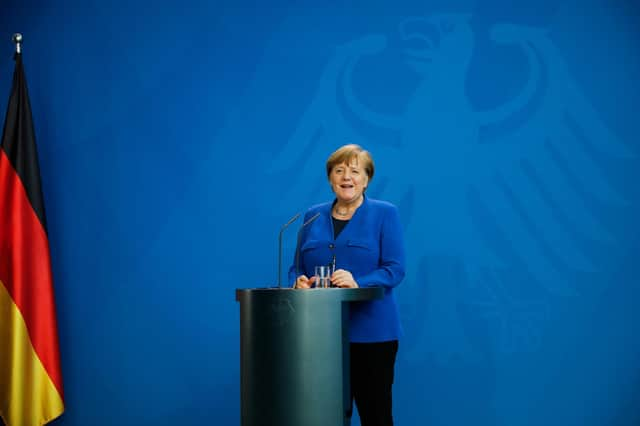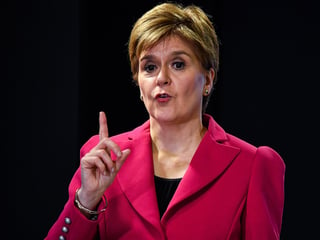Covid-19: The UK could already have the highest death rate in the world – Joyce McMillan


Thursday lunchtime, and the First Minister is setting out her criteria for Scotland’s gradual possible unwinding from the coronavirus lockdown. It is not a cheering event; so much so that one journalist even asks whether Christmas has been cancelled.
There is, though, one outstanding merit in the First Minister’s press conference, and that is its sober realism. She is clear about the extent of our lack of knowledge of coronavirus, including the fact that she and her advisers still cannot be precise about the transmission rate of the disease in Scotland, although they hope to be soon. She is clear about the criteria which will come into play, once decisions start being made about which activities can safely be restarted. And she is clear that in the longer term, greater relaxation will only be possible if we succeed in putting in place a testing and tracing system to rival those in Germany, South Korea, Singapore and Taiwan, which have succeeded in keeping their death rates from Covid-19 at levels of which we in the UK can now only dream.
Advertisement
Hide AdAdvertisement
Hide AdFor although rates of infection and death in Scotlnd remain lower than the UK average, we are nonetheless, with the rest of the UK, now undergoing a worst-of-all-worlds Covid experience, with both some of the highest death rates in the world, and a lockdown so strict and prolonged that huge economic damage is unavoidable. At the moment, the UK is recording the world’s highest daily death toll, outside the United States; and it is increasingly acknowledged that those figures – which now put the UK’s total Covid deaths at more than 18,000 – represent a radical underestimate, covering only deaths in hospital of those already tested for Covid-19.
This week, for example, CNN in the United States reported that deaths in the UK were probably 40 per cent higher than the official figure; and then, on Wednesday, the Financial Times published an article, based on Office of National Statistics figures, estimating that Britain’s true current death toll from Covid-19 is not 18,000 but 41,000 – a figure which, if accurate, would give Britain a current death rate per million citizens of more than 600, the highest in the world.
Hit new viruses early and hard
Of course, many other governments may also be issuing unreliable statistics. Germany’s death rate per million citizens, though, is currently 64; and as a result, the national trauma inflicted by the disease, both emotional and economic, will be on a different scale to that being suffered here. As New Zealand’s Prime Minister Jacinda Ardern put it, the trick with novel viruses like this one is to hit them early and hard with lockdown and suppression measures, and remain relentless in tracking them down thereafter. But under the influence of a familiar transatlantic network of extreme pro-market thinkers, the British and US governments fiddled and debated for too long, through late February and early March, while the virus became widespread in their populations; and now, families and businesses across the UK are paying a heavy price in grief and destruction – too often, the heaviest price of all.
That much needs to be learned from this catastrophic failure – currently taking British lives at the rate of eight or ten Grenfell disasters a day – is obvious. What is terrifying about the response here in Britain, though, is the extent to which the scale of the disaster is somehow being pushed down the news agenda, to be replaced by endless premature speculation about when lockdown might end, and by ‘morale-boosting’ news stories about how Britain is “beating the virus” by doing charitable stunts to raise funds for its cash-starved health service. It’s not that there has been no brilliant British journalism about the reality of our Covid crisis; there has, and some of it is desperately moving, as well as revealing about the failures of leadership that led us to this point.
Atmosphere of denial
When it comes to the main news bulletins on which most people rely, though, the tone is both statistically vague, and unaccountably positive; there are pitying and sometimes apocalyptic reports about the handling of coronavirus in other countries, but rarely or never the stark comparison which tells us that however bad things have been in France or Spain, the final outcome for the UK is likely to be worse. Small wonder that polls suggest millions of Britons believe Britain is not suffering so badly as those countries, and that the UK Government is doing “a good job”; it’s a big lie supported by dozens of small editorial decisions, from the endless emphasis on the back-garden fund-raising of 99-year-old Tom Moore, to the foregrounding of Second World War rhetoric which suggests that while lesser countries have gone down to defeat, Britain is somehow smiling through.
How this atmosphere of denial must feel to those brutally bereaved by this epidemic is difficult to imagine; grief denied and disrespected often turns to anger, and few would blame them if it did. What it means for the nation though, is in the end also a matter for grief and dread. Because if the UK continues to deceive itself about the extent of its Covid-19 failure, and about the deep roots of that failure in the politics of denial, delusion and fakery it has increasingly embraced over the last decade, then it has no chance of learning the positive lessons that should flow from this scarring experience. On Monday, the Sun newspaper published an already notorious front page, showing on the left an image of a minor female celebrity in a revealing red dress, on the right a headline proclaiming that the pubs might be shut until Christmas, and somewhere in between, a tiny yellow blob containing the words “596 dead, see p.4”.
That cruel front page will become one of the iconic images of the Covid epidemic of 2020, in the UK. But whether we will continue to live in the bamboozled and deluded country it reflects, or will decide - jointly or separately – to set about creating a better future, based on stronger values and clearer thinking, remains the great unanswered question of this strange time; and one which all of us, as citizens, must now gradually begin to answer.
Comments
Want to join the conversation? Please or to comment on this article.
